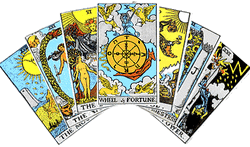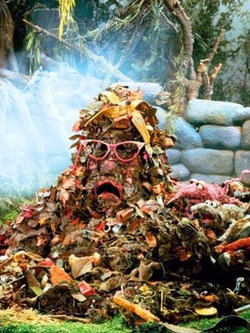 Why do I love Tarot? Because Tarot is about stories. It's about creating a life where you walk with wanderers, magicians, and kings. Where you see the big, powerful themes of your life, and the small but poignant scenes that make up who you are. Where you're able to review your life's story and see how you want it to be told. Because it's about possibilities. Because I can take a look at seven cards laid out in a pattern and see myself reflected back at me - parts of me I'd never considered before, and options I'd never imagined. Because when we're bogged down by too many choices, or by a sense of being overwhelmed and lost, we're able to illuminate our path and see one direction where it might lead. Because Tarot is art. It's taking 78 ideas, 78 moments from life, and seeing the myriad ways those images have evolved and changed from person to person, theme to theme, artist to artist. It's seeing the unique lens through which each deck views our lives, and then learning about yourself through which images speak to you. Because the world needs magick. Because we're magick, and the sheer power and beauty of peering into the unknown and calling up what we find there is something we're never too old for. ------ Want to command the elements with the Magician? Harness your creativity with the Empress? Tarot Journeys: Of Mentors and Magic Wands is available to teach you the unique lessons of the Major Arcana! Go check it out!
 I've been rewatching a lot of Fraggle Rock lately, since my girlfriend with a decidedly HBO-deprived childhood has never seen it. Yeah, yeah, I'm a grown-up and I'm supposed to be above these things. But screw my credibility. There's a lot of simple wisdom in kids' stuff that we don't really remember to touch as adults, and it's Jim Henson, creator of the Muppets and Sesame Street, which should say it all.
And Fraggle Rock? Has to be the most pagan show I've ever seen. A living, breathing system of caves that teach about the interconnectedness of life? A festival where you compose tributes to the full moon? And if you want to teach a newly-minted teenaged Wiccan about why she can't be initiated just yet, just show her "Mokey and the Minstrels".
Then there's Marjory the Trash Heap, the "all-knowing" oracle who pings me quite a bit for obvious reasons. She demonstrates some genuine power and insight towards the end of the series, but mainly Marjory is kind of a shyster - someone who gives you not-quite-groundbreaking sayings or junk objects in the form of talismans. She does claim to be all-knowing, but the Trash Heap doesn't really take payment for her services. She's more than happy to dispense a little bit of cryptic practicality, watch the Fraggles mistake it for deep wisdom, and then let them work out their own problems with this new bit of direction. Her ultimate goal is the goal of all great oracles: to no longer be needed.
And often, the magic works. Anxious Boober feels a surge of courage when clutching a bottlecap inscribed with the words "no deposit, no return." Red and Wembley learn the charm of spilling a bottle of milk and pointedly not crying over it, which gives them the confidence to finally stop worrying and make a plan.
What Fraggle Rock knows, and what Tarot readers know, is that objects and sayings aren't the important thing. There are literal "junk oracles", where you draw discarded odds and ends out of a bag and make observations based on what you find/the meanings you attach. And they're much the same as Tarot's lovely, inspiring, and extremely subjective art. The power is in the reader, whether that's intuition or just plain common sense. It connects us to the magic of the world, taps us into something bigger.
The insights from divination are personal insights, a little nudge in the right direction. They encourage someone to understand the situation and get moving, with the confidence that they knew a little more about themselves and their path than they did half an hour ago. There's a tremendous, often magical power in that. And the greatest power of all, of course, is that you can put a little of your focus and intention into the world - and get a great deal back out of it, no matter what tools you use.
"No deposit, no return."
 If you ask witchy types what a "Fluffy Bunny" is, you'll get a hundred different answers.
They talk about white light, and the people who hate them are just cynical jerks. They talk about white light, and judge anyone who shows anger or pain. They judge spiritual paths that are too "scary". They're too accepting of just about anything in their spiritual path, without doing the proper research and work. They trust authors that are inaccurate - no one can agree on which authors, mind you, or just what the inaccuracies are .
Really, the only way I made peace with my fear of being a "fluffy bunny" was when I ignored the conversation altogether. Historical accuracy was something I could gauge, so I checked if that was up to snuff, and the rest? Whatever works for you. And it all seemed to, so why should I care?
But a few weeks ago, a conversation popped up about Tarot that brought the whole idea into my thoughts again. The heated debate went: Tarot has been used to teach spiritual mysteries, and has been part of a lot of magickal ceremonies. Now, it's mostly used for "fortune-telling". Has Tarot been turned into a fluffy New-Agey oracle? Has the "real" meaning of things been corrupted somehow?
I mainly rolled my eyes and ignored the whole thing, as more people slowly broke in: intuitive Tarot isn't as "meaningful." Just teaching the symbolism and magickal meanings aren't as "accurate." And my favorite: we all needed to "admit" that intuition wasn't real, was just an element of our imagination, that there's no such thing as psychic development. Only then can we grow spiritually.
And I thought: Seriously, guys? Seriously? You just talked about the names of God and the angelic correspondences to the Tree of Life, and you're an authority on whether something is made up or not? We work with the Platonic elements and robes and magic wands. We discuss the meaning of 78 pieces of artwork printed on card stock. Most people think we're ridiculous.
And even if you don't, and you're the most mainstream Judeo-Christian out there: someone still thinks you're just talking to imaginary friends.
The human mind is so vast, so varied, so full of thoughts and ideas. Patterns and symbols and stories, they're part of how we learn and grow. That's what Tarot is all about: seeing what story the cards tell you, and using it to inform your life and the choices you make. So unless you are flat-out inventing stuff, or appropriating cultures and passing it off as "authentic", your spiritual life? None of my business.
If you want to develop as a psychic, a witch, a Tarot reader, or even just a spiritual person, there are three whole things you have to do:
- Learn as much about what you want to know as possible.
- Practice it.
- Don't be an ass to people who do it differently.
Tarot's a giant spiritual metaphor, a psychic springboard, a set of journaling prompts, the Book of Life, a storytelling kit, a card game, and a set of 78 pieces of artwork. But really, it's a tool. Your magickal, fantastic mind does the work. And that's as it should be.
How do you Tarot? And what are your thoughts about fuzzy little lagomorphs and the hardasses who love them? I'd love to hear your thoughts!
|



 RSS Feed
RSS Feed

